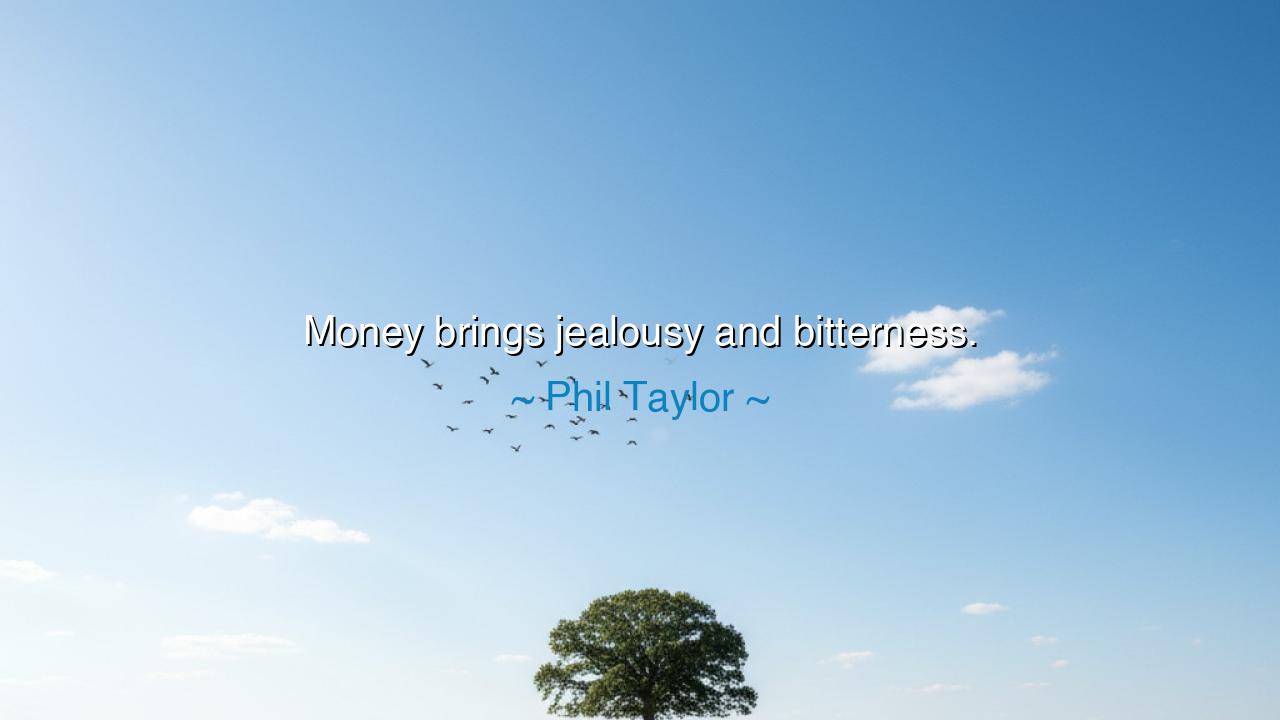
Money brings jealousy and bitterness.






“Money brings jealousy and bitterness,” said Phil Taylor, a simple truth wrapped in the harsh fabric of human nature. It is a statement not of contempt for wealth, but of sorrow for the hearts that cannot bear its weight. For money, though a servant when rightly used, often becomes a master when wrongly worshipped. It blinds the eye, hardens the heart, and divides brother from brother. In the hands of the wise, it builds; in the hearts of the envious, it burns.
From the dawn of civilization, men have chased gold as though it were sunlight that could be captured in their fists. Kings have waged wars for it; families have torn themselves apart because of it. In the marketplaces of Babylon, in the palaces of Rome, and in the banks of our modern age, one truth remains: where money multiplies, so too do jealousy and bitterness. The rich are envied by the poor, the poor despised by the rich, and neither find peace, for both have allowed value to be measured in coin rather than in character.
Consider the tale of Croesus, the ancient king of Lydia, famed for his unimaginable wealth. His name became a symbol of prosperity, yet his end was bitter indeed. When he sought to use his treasure to buy divine favor, he was reminded by the oracle of Delphi that gold cannot purchase wisdom, nor can it shield a man from fate. When his empire fell, his gold could not save him, and his enemies mocked the very thing that had once made him proud. Thus, jealousy and bitterness consumed both those who envied him and the king himself, who learned too late that riches without virtue are but gilded chains.
Even in our own time, the story repeats. The athlete who rises from humble beginnings to fortune often finds old friends turned cold, family turned greedy, and strangers wearing smiles that hide daggers. The very hands that once applauded now point with envy. Money, that shimmering illusion of power, exposes the weakness in human hearts—it reveals who loves us for who we are, and who for what we possess. Many a soul, like Taylor himself, has found that victory on the field is easier than peace in the heart once wealth enters the arena.
And yet, it is not money itself that corrupts, but the spirit of envy that festers around it. The ancients taught that virtue is the true measure of wealth. Socrates owned little, yet was rich in wisdom; Diogenes lived in a barrel, yet mocked the emptiness of kings. The man who commands his desires is greater than the man who commands nations, for he is not ruled by jealousy, nor poisoned by bitterness. When one sees his neighbor prosper and feels joy instead of envy, that is the beginning of freedom.
The wise must learn to see money as water—it flows where it is directed, and stagnates where it is hoarded. Used rightly, it nourishes and brings life; used wrongly, it becomes a swamp of resentment. Give it purpose, and it will serve the good. Share it, and it will multiply in blessings unseen. But grasp it too tightly, and it will corrode the soul as rust devours iron.
Therefore, let every man and woman remember: wealth is not evil, but the worship of wealth is a slow death of the heart. Do not measure your worth in coins or possessions, but in peace, honor, and kindness. When you see another rise, rejoice—for their success does not steal from your light, but adds to it. When fortune smiles upon you, be humble, and use it to lift others rather than stand above them.
For in the end, gold turns to dust, but character endures. Jealousy fades when the heart is content; bitterness dies when gratitude blooms. The truly rich are not those who have the most, but those who give the most. So walk wisely, seek balance, and remember always the wisdom of Phil Taylor’s words: money brings jealousy and bitterness—but only to those who forget that love and virtue are treasures no coin can buy.






AAdministratorAdministrator
Welcome, honored guests. Please leave a comment, we will respond soon